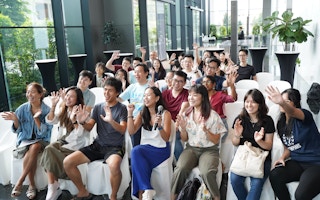In my work with young people active in the Singapore environmental scene, I’ve recently noticed that youth environmentalists are starting to become more open with and vocal about their personal insecurities. One struggle that they face, and that is constantly brought up: how do you make sure that the work that you do matter, given how crowded the space already is, and the fact that the government, traditionally the biggest and most influential stakeholder in the climate action discourse, has already gotten on board tackling the existential crisis of our times and setting the main agenda?
To continue reading, subscribe to Eco‑Business.
There's something for everyone. We offer a range of subscription plans.
- Access our stories and receive our Insights Weekly newsletter with the free EB Member plan.
- Unlock unlimited access to our content and archive with EB Circle.
- Publish your content with EB Premium.
In short, many of them find it difficult to mobilise for climate action and to convince others that individual choices matter and could be fundamental to battling the consequences of the climate crisis. In fact, given the flurry of news and information about everything that has to do with national sustainability efforts and climate development, there is a sense of loss as to what and where they should direct their attention to. Most would hesitate to label themselves as changemakers.
At a recent panel on youth activism that EB Impact, the social impact outfit I work with organised, as part of the ongoing Go Green SG series of activities initiated by the Singapore environment ministry, local youth environmentalists spoke candidly about how the Singapore environmental scene has evolved. Some who joined early in the movement were familiar with a landscape where not much was said about sustainability, and they could easily find a space to occupy and make themselves relevant. Newcomers now navigate a much higher barrier, as they are surrounded by many, including experts, who already engage in climate communication. How do they make sure that there is veracity in their messaging? How do they add on to the conversation, when they know there is already fatigue from the constant climate talk and the never-ending media headlines?
The feeling of being an impostor, however, is quite common in the youth environment activism space. Increasingly, young environmentalists are speaking up about how self-doubt and a perceived lack of experience have held them back from meaningful work. Even as they experience outward signs of success – getting award recognition, gaining in social media following, or being nominated as a representative at global or regional summits – they might still feel unqualified at times or don’t see themselves as legitimate spokespeople for an issue that is both complex and critical. Many say they sometimes struggle to align their personal values and beliefs with the collective goals of the movements they belong to.
The Singapore youths on the discussion panel had some good advice for dealing with this sort of anxiety and concern. I observe that these are mainly centered on the importance of mental health and preventing fatigue. Environmentalist Ho Xiang Tian, who is in his 20s, and the co-founder of advocacy group LepakInSG, has had experience in putting himself on the frontline and speaking at climate rallies, but says he values teamwork too, as having close allies and a strong support structure can help an activist commit to the long haul. For example, Ho shared that trudging through environmental impact assessment reports for potential development projects in Singapore was key to his work, but these could be laborious if one takes it on alone (reports can go up to 600 pages), and he tries to get his teammates to share the load.
Samantha Thian, chief executive and founder of Seastainable, a social business supporting marine conservation, advised youths to hinge their sense of self on sustainability work. Her practical tip? Abide by the “Rule of Three” – which means having two other interests or roles that one can “draw one’s sense of self from”, and not just equate success or failure to your capacity to handle climate-related work.
I think another valuable advice is for youth environmentalists in Singapore to be more specific in their cause, and not just speak broadly about sustainability. This could be in waste management, marine conservation, international diplomacy or workers’ rights. Action grounded in knowledge and interest can fulfil youths’ desires to have greater impact on the issues that affect them.
There are already good examples of youths in Singapore looking at how climate and environmental issues intersect with key social priorities, as well as a search for a distinct identity or brand of activism. Taking into considerations some of the limits to environmental action one can encounter in the Singapore context, many have forged to chart their own paths, rather than try mimicking the work of other environmentalists. Take the example of Farah Sanwari, who is in New York this week as a youth representative, as Singapore participates in the second Voluntary National Review (VNR) of the sustainable development goals at the United Nations High Level Political Forum. Sanwari runs FiTree, a non-profit environmental volunteering group for Singapore Muslim youths that interestingly looks at centering faith in climate conversations. FiTree’s impact goes beyond forging unity within the Islamic community, but in a multi-racial and multi-religious city-state, has the potential to bring about greater understanding of unique perspectives that are accessible only if we are willing to put on a different lens when we look at the climate issue.
As Singapore positions itself to be a green finance hub in Asia, youth environmentalists could find that there is a need for them to be well-equipped with knowledge on the latest developments regarding climate reporting, compliance, and broadly how corporates are dealing with burgeoning climate risks too. This is so that they can hold companies to account, as well as work with the private sector to bring about greater change.
Lastly, it is true that we still don’t know much about the difference individuals can make, and this often becomes part of the problem. Many say citizens can’t impact anything in a meaningful way until there is greater action at the state level. It is an easy way to wipe off individual responsibilities and a convenient reason to turn a blind eye on the crisis, but we should stop constantly picking at small and local efforts as being “pointless” or “useless”. Activities like beach clean-ups might not ultimately be the key lever of change to solve the ocean plastic crisis, but simple as they are, they still hold value. It is only if we recognise this that we can help youths take the first step, and not be deterred or paralysed by the mere thought of having to jump multiple hurdles and gain deep technical expertise before they can do something to help. Let’s not see small acts of volunteering as just placations of desires to act on an issue – they can be useful to people who want to explore their interests and gather a personal understanding of where they stand on certain issues.
It could also be a good thing that youths are feeling a little anxious about not being able to own the labels of being an “environmentalist” or an “activist”. This nagging sense that they still do not know enough can push them to keep asking the right questions. We just need to give them adequate support so they are not afraid to step up, and build platforms where they can become each other’s inspiration as they seek to find their own voice.
Kaamela Barvin is the community and marketing manager at EB Impact, a non-profit based in Singapore dedicated to delivering training and initiatives that advance the United Nations Sustainable Development Goals in Asia. Youth environmental action is a key strategic area that EB Impact looks at. It is a sister organisation to Eco-Business.
More than 300 activities have been planned by the Ministry of Sustainability and Environment over the month of July 2023 to rally members of the public and organisations to take collective action for environmental sustainability. Find out more about Go Green SG here.









